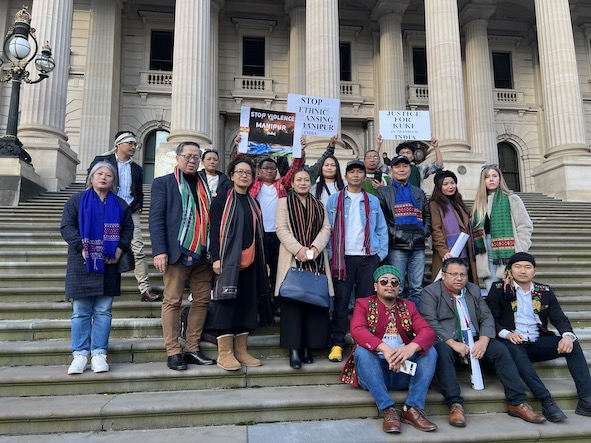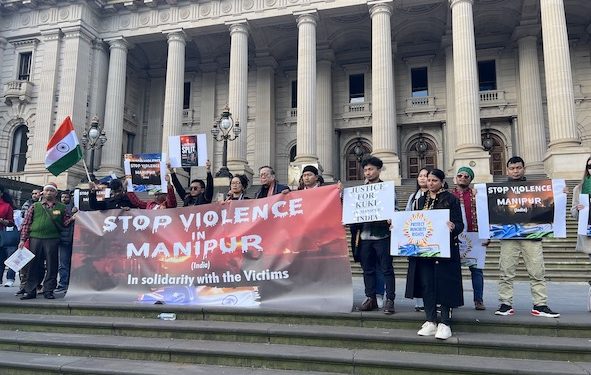A protest rally was held on Sunday on the steps of the Parliament of Victoria in Melbourne in a show of solidarity towards the victims of ethnic violence in the Indian state of Manipur.
The rally was organised by the Indian Overseas Congress – Kerala Chapter, the protestors carried placards urging the Indian government to ‘Stop Violence in Manipur’.
Suresh Vallath, former president of IOC – Kerala Chapter, who introduced the other speakers, spoke about the background of events that led to the escalation of violence and criticised the state chief minister Biren Singh for his divisive agenda that caused division within the community.
“This humanitarian catastrophe was allowed to happen with complicity from the state and federal governments”, Mr Vallath said.
Afzal Abdul Kadar, addressing the gathering, said that the state and central government need to be held accountable for their failure to maintain peace.
“The government’s primary responsibility is to safeguard the wellbeing of its citizens and maintain harmony. Unfortunately, their response to the riots in Manipur has been severely lacking. Inaction and negligence has led to the suffering of innocent people”, Mr Afzal said. He said he strongly believed it is the duty of all to speak up, raise awareness and seek accountability from the concerned governments.
In an emotional address, Rebecca Lhouvum, a Manipuri Kuki, lamented that her home state was burning and she was not able to visit her homeland and help her people who are suffering.
“I am not here to talk against any other community. I am here to share the pain that me and my friends, my family and my people have been going through. I am here for justice for all the victims of rape and murder.”
Ms Lhouvum said the state government should have contained the violence but deliberately did not. She said her aunt’s house was burnt down and she had to flee to save her life. She said she had been hearing painful stories of the sufferings from her friends and relatives. The thanked the Indian Army and Assam Rifles for their role in saving ba number of lives. She urged the Indian government to bring justice to the people of Manipur who have suffered.
Activist Tanvi Mor said she wanted to speak as a person of privilege in the name of humanity and expressed her hope for peace and return for normalcy for the people of Manipur.
Jacob Andrewartha of Socialist Alliance called the sexual violence inflicted on Kuki-zo women as “nothing short of despicable that should be condemned”.
“In light of these horrific acts, we have to stand in solidarity with the Kuki-Zo community of Manipur.” Mr Andrewartha said. He called it a systematic genocide of a minority population. He condemned the cutting of internet to repress the news of what was going on in the state. He called out Prime Minister Modi for not condemning the violence in Manipur until the publication of the that horrific video of two women being paraded naked and sexually assaulted by a mob of men.”
Others who spoke at the rally include Kham Khual, Sawm Suante, and Sai Buoy – all from Manipur, Waseem Razvi – Imam of Tarneit Mosque and Aftab Mohammad, President – IOC UP & Bihar, among others.

What is happening in Manipur?
Ethnic conflict has driven the small Indian state of Manipur into a situation many describe as a state of civil strife, as the two primary ethnic groups, the Meitei majority and the Kuki minority, engage in a struggle for control over land and influence.
In July, a disturbing video surfaced depicting a May incident where two Kuki women were publicly humiliated by Meitei men. This degrading act occurred shortly after their village was destroyed, marking another distressing instance of terror targeted at women within the region.
Situated in the hilly northeastern region of India, Manipur lies to the east of Bangladesh and shares a border with Myanmar. The state accommodates an approximate population of 3.3 million individuals.
Of this population, slightly over half are Meiteis, whereas around 43% comprise Kukis and Nagas, the primary minority communities.
Since its inception in May, the violence has resulted in a death toll of at least 130 individuals, with 400 others sustaining injuries. Over 60,000 people have been displaced from their homes as the armed forces, paramilitary units, and police strive to suppress the unrest.
How did it start?
Tensions escalated when Kuki individuals initiated protests against the Meitei community’s insistence on obtaining formal tribal recognition. The Kukis contended that this move could potentially augment the Meiteis’ existing significant sway over governance and society, enabling them to acquire land or establish settlements within primarily Kuki-populated zones.
Nevertheless, a multitude of underlying factors contribute to the conflict. The Kuki faction asserts that the Meitei-dominated government’s campaign against drug trade serves as a smokescreen to displace their communities.
Compounding matters, unauthorised migration from Myanmar has intensified tensions. The pressure on land resources stemming from a burgeoning population, coupled with elevated unemployment rates, has driven the youth towards involvement with various militias.
What is the Indian Government doing?
Prime Minister Narendra Modi had maintained a silence concerning the turmoil in Manipur. However, his stance shifted upon the release of a video depicting the attack on May 4th. In response, he expressed that the incident had cast a shadow on India’s reputation and vowed that those responsible would face consequences. He asserted, “No guilty party will escape… the reprehensible actions against the daughters of Manipur can never be pardoned.”
Nonetheless, numerous citizens of India are questioning the delay in his public address regarding the situation in Manipur.
To counteract the ongoing surge of violence, the Indian government has deployed a contingent of 40,000 soldiers, paramilitary forces, and police to the area. Despite calls from tribal leaders, the government has thus far refrained from implementing direct rule.
Regrettably, the violence persists, resulting in the continued displacement of villagers from their homes.
Who runs Manipur?
The Bharatiya Janata Party, headed by Mr. Modi and in control of the Indian government, similarly holds sway over the state administration in Manipur. This state leadership is under the guidance of N Biren Singh, a Meitei by origin.
Despite constituting 53% of the population, the Meitei community maintains control over 40 out of the 60 seats in the regional parliament. However, the Kuki population contends that Mr. Singh’s recent campaign against poppy cultivation for the heroin trade disproportionately affects Kuki-inhabited areas.
The government led by Mr. Singh has accused Kuki insurgent factions of instigating unrest within the community.











